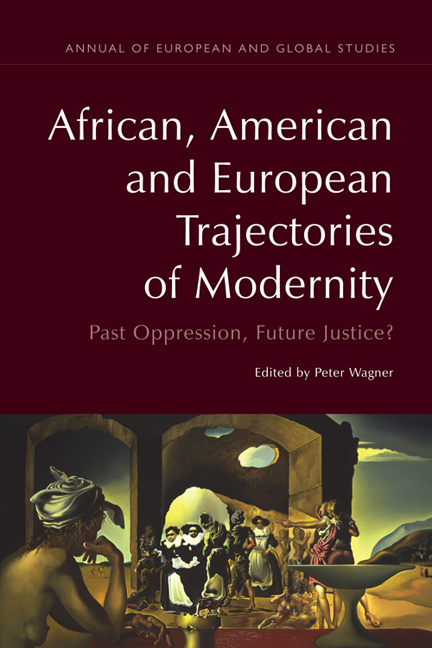Book contents
- Frontmatter
- Contents
- List of Figures
- Introduction
- Part I Reconstructing the History of Atlantic Modernity
- 1 The American Divergence, the Modern Western World and the Paradigmatisation of History
- 2 The Limits of Recognition: History, Otherness and Autonomy
- 3 On Being in Time: Modern African Elites and the Historical Challenge to Claims for Alternative and Multiple Modernities
- 4 The Sublime Dignity of the Dictator: Republicanism and the Return of Dictatorship in Political Modernity
- 5 The Luso-Brazilian Enlightenment: Between Reform and Revolution
- Part II Comparing Trajectories of Modernity in the South
- Part III Claims for Justice in the History of Modernity and in its Present
- Notes on the Contributors
- Index
1 - The American Divergence, the Modern Western World and the Paradigmatisation of History
from Part I - Reconstructing the History of Atlantic Modernity
Published online by Cambridge University Press: 05 August 2016
- Frontmatter
- Contents
- List of Figures
- Introduction
- Part I Reconstructing the History of Atlantic Modernity
- 1 The American Divergence, the Modern Western World and the Paradigmatisation of History
- 2 The Limits of Recognition: History, Otherness and Autonomy
- 3 On Being in Time: Modern African Elites and the Historical Challenge to Claims for Alternative and Multiple Modernities
- 4 The Sublime Dignity of the Dictator: Republicanism and the Return of Dictatorship in Political Modernity
- 5 The Luso-Brazilian Enlightenment: Between Reform and Revolution
- Part II Comparing Trajectories of Modernity in the South
- Part III Claims for Justice in the History of Modernity and in its Present
- Notes on the Contributors
- Index
Summary
THIS CHAPTER IS an invitation to rethink some narratives about the emergence of the modern Western world– restricted to Europe in the beginning and then expanded gradually to encompass the United States of America– and the ways in which this process has been explained through historical accounts at the turn of the eighteenth and nineteenth centuries. It is an attempt to return to a societal process that was left aside when what was happening in a ‘borderline’, liminal time and space became the status quo. More to the point, the focus here is on some aspects of what was regarded as America, the ‘New World’, before and after the modern ruptures that occurred in the liminal ‘age of revolutions’ (Wagner, 1994; Armitage and Subrahmanyam, 2010). It is argued that America went through a process of bifurcation, or divergence, of North and South, at exactly the point when certain historical events of the eighteenth and nineteenth centuries started to be seen as inaugurating the modern times. In this process, many of the links which were used to make the New World as a whole a significant idea started to change in the early nineteenth century, became strongly separated out in the second half of this same century, to become irreconcilable after the first decades of the twentieth century.
America as a whole did make sense and had its significance expressed in the way in which the relation between the New and the Old World was conceived between the sixteenth century and the beginning of the nineteenth. This was stronger for the closest ones– mainly Europe and Africa– and weaker for the distant– the so called ‘Asia’– (Dussel, 2007). In the first section of this chapter, I explore the significance of the New World in a two-fold way: firstly, by exploring some philosophical approaches of the two centuries after the ‘discovery’ of the New World which reveal an aspect of this meaningful space. As one can see in the use of this term in the philosophical schema of John Locke, the qualitative distinction between the areas of America was not taken for granted since the appearance of the new continent on the world map.
- Type
- Chapter
- Information
- African, American and European Trajectories of ModernityPast Oppression, Future Justice?, pp. 21 - 41Publisher: Edinburgh University PressPrint publication year: 2015



